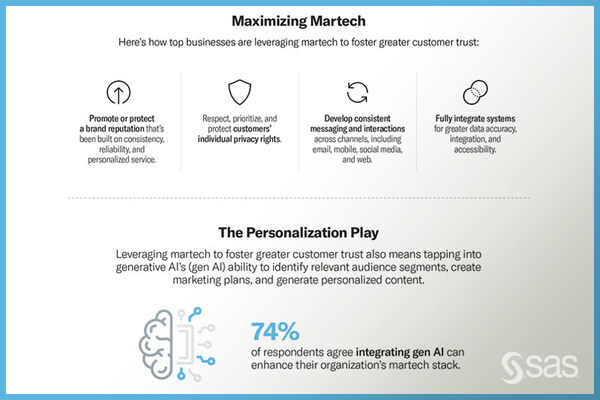Marketing technology (MarTech) can help companies create personalized experiences, deliver clear and consistent messages, and tailor content to relevant customer needs. Yet barriers prevent these technologies from fostering customer trust, per a new report from Harvard Business Review Analytic Services, sponsored by data and AI leader SAS.
Download the report: Optimizing the Use of Marketing Technology to Build Customer Trust.
Harvard Business Review Analytic Services surveyed members of the Harvard Business Review audience who are involved in marketing decisions at their organization and familiar with their marketing department’s use of MarTech.
MarTech challenges
The survey found that 91% of respondents consider customer trust to be very important to their organization’s success. And 81% say MarTech has a significant or moderate impact on nurturing and fostering this trust.
Yet, per the report, most MarTech stacks are comprised of dozens of disparate solutions often deployed within siloed systems. And 38% of respondents cite difficulty integrating new technologies into their existing stack as a barrier preventing MarTech from having a positive impact on customer trust for their organization.
Respondents also cited data-related barriers preventing MarTech from having a positive impact on customer trust for their organization, including poor data quality (37%), silos of customer data (36%) and lack of real-time data access (29%).
Other factors that can pose a threat to customer trust, per the report, included inconsistent messaging across channels (31%), inadequate customer service (30%), and marketing messaging and content not aligned with customer needs (30%).
Growing interest in GenAI
Despite the challenges, MarTech offers powerful capabilities that can help nurture customer trust and loyalty. Per the report, marketers are particularly interested in generative AI (GenAI) and its potential to help identify relevant audience segments, create marketing plans and generate personalized content.
In fact, 74% of survey respondents agree that integrating GenAI can enhance their organization’s MarTech stack. And in the next year, 37% of respondents said that their organization intends to increase their expenditure on GenAI – more than any other MarTech solution.
Yet for all its hype, adoption of GenAI in marketing has been gradual. Only 13% of respondents have fully implemented GenAI for marketing purposes at their organization, while 45% are currently piloting or exploring GenAI for marketing purposes.
Among those organizations currently using GenAI for marketing purposes, 36% are using it for customer support needs via chatbots and virtual assistants; 30% are creating more user-friendly and intuitive online experiences; and 29% are incorporating advanced security measures to protect and secure customer data.
“Responsible marketing driven by the careful application of MarTech like GenAI delivers real benefits to brands. Through a more targeted, personalized approach, marketing campaigns can be more easily managed and produce better results.
And by automating simple, repetitive tasks, GenAI frees marketers to focus on more complex and mission-critical tasks where they can apply their creativity, experience and skill,” said Lisa Loftis, Global Principal for Customer Intelligence at SAS.
GenAI and MarTech solutions, despite challenges, are helping more and more organizations act responsibly with customer data, while providing relevant information, timely offers and agile support. When customers trust a brand and see value in their interactions with it, they will more readily share personal data that powers a hyper-personalized – and hyper-effective – marketing approach.
Learn more about how organizations are using SAS MarTech solutions.
MARKETING Magazine is not responsible for the content of external sites.










